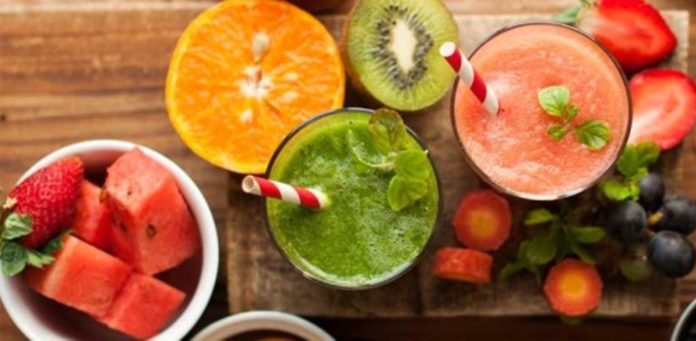Most arguments about best and worst diets are missing the point: The best diet is one that you can stick to (provided it meets all of your nutritional needs).
“The best ‘diets’ are the ones that are doable over the long haul and allow themselves to be fit to the person, not for the person to have to fit to the diet,” Jill Coleman, MS, nutrition and weight-loss expert, tells Yahoo Health. “For people who need to lose weight, no short-term diet will work to shed fat and keep if off for good.”
With that said, there are also some diets that are just plain ridiculous — or ridiculously expensive. Case in point: the four weight-loss strategies below.
1. The low-carb, high-booze diet
Nowadays if you have martinis at every meal, most people would agree you might want to cut back on the alcohol. But in 1964, the prescription to limit carbs and enjoy as much steak, whiskey, and vodka you want was the new fad. The Drinking Man’s Diet, a small pamphlet, sold 2.4 million copies within two years.
You can now order the Kindle edition on Amazon, where customer reviews give it an average of 4.2 out of 5 stars. Says Amazon reviewer shocked!: “I just started this diet today and I think it’s working because I already feel slimmer. Or perhaps I’m drunk. :)”
Although low-carb diets can be effective for weight loss, the calories in alcohol — plus the other detrimental health effects of heavy drinking — make this plan one we’ll leave on the bottom shelf.
2. Anti-charity weight-loss wagers
Some websites, such as Stickk, will keep you accountable to your weight-loss goals in the cruelest of ways: by donating your money to a cause that you hate (say, the campaign fund for Hillary Clinton or Donald Trump) if you don’t meet your targets.
Effective? Maybe. Waste of money? For sure.
To be fair, you do set your own rules, including how much money you’ll donate and your specific milestones. But there are better ways to bet on your success than giving money to something you abhor.
DietBet.com and HealthyWage.com are sites that let you wager on your weight-loss and receive a cash incentive when you meet your goals. Or, if the threat of losing money is more motivating for you, go the old-school way: Make a friendly wager with a friend. Perhaps your Trump-loving cousin?
3. Prepared juice cleanses
Super-trendy juice cleanses promise to “flush out toxins” and “reset your system.” The idea: By drinking only special juices made from vegetables, fruits, nuts, herbs, spices, and other superfoods, you eliminate toxins and jump-start weight loss.
Yeah, about that. “The claim to ‘rid your body of toxins’ doesn’t mean anything,” weight-loss and obesity specialist Charlie Seltzer, MD, tells Yahoo Health. “We have a whole organ, the liver, devoted to it. Our bodies are well-developed at detoxifying ourselves.” Plus, most of these juices don’t contain adequate protein, Seltzer says.
As for the claims that juice cleanses can help you shed pounds: “Weight loss happens when you eat fewer calories than you burn. It has nothing to do with toxins,” Seltzer adds. “After seeing people try this for years and years, I can tell you that for 99 percent of people it doesn’t work. You get so hungry after two days that you binge.”
Most juice cleanse companies do recommend a one-day or three-day fast for beginners, but they also sell longer juice cleanse plans ranging from five to 20 days.
And here’s the kicker: Some popular pre-made juice cleanses cost upward of $70 per day. That’s $200 or more for a three-day cleanse. While these juices may be loaded with antioxidants and nutrients, you know what else is? Fruits and vegetables from the grocery store — and for a fraction of the cost.
4. Weight-loss supplements
Americans spend $2 billion on weight-loss supplements each year in the United States, according to the National Institutes of Health. It would be unfair to say that none of them work at all, but don’t believe the overhyped marketing claims that these pills can help you shed piles of body fat fast.
Some supplements, such as green coffee bean extract, garcinia, and green tea extract, do have some evidence showing their efficacy — and some studies that say they don’t work. “If anything, they’ll help you lose maybe an extra half-pound,” Seltzer says. “The context in which these products are sold is completely ridiculous. And some of them, like raspberry ketones, don’t work at all.”
Take green tea extract as one example. A recent study found that obese women taking green tea extract lost an average of 2.4 pounds over 12 weeks — not much compared to the 1- to 2-pound-per-week guideline experts recommend for losing weight with diet and exercise. But that’s just one study. A 2012 Cochrane Review looked at 15 studies involving nearly 2,000 people to determine the effect of green tea extract on weight loss and weight maintenance for people who were overweight or obese. Their conclusion: The effects of green tea extract were small and statistically insignificant (meaning they could simply be due to chance).
The cost for that small, statistically insignificant weight loss: About $20 per bottle.
A better way to spend your money:
Take the dollars you’re saving on supplements or juices, and use it to buy a high-quality protein powder to take after your workout, Seltzer recommends. Or spend a little extra cash to load up on high-quality, fresh foods at the farmer’s market or grocery store.
“You’ve heard it a million times, but it’s true: A healthy diet needs to be a lifestyle change,” Coleman says. Specifically, it should be a strategy that allows some flexibility and doesn’t keep you from doing the things you love (like eating out with friends). “So much of this comes down to practicing moderation. And yes, you can get weight-loss results with moderation, too.”
Source : https://in.style.yahoo.com/beauty/4-diets-that-are-a-waste-of-money-205951200.html















